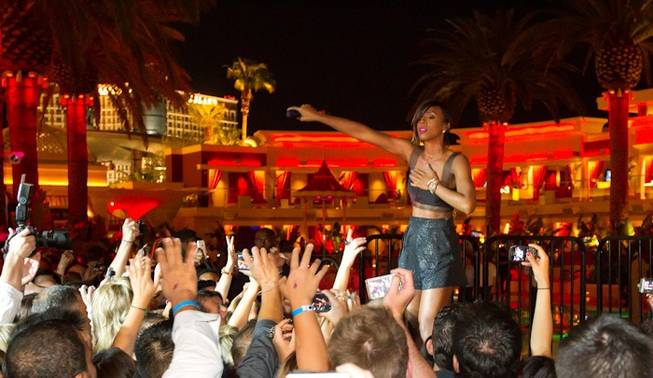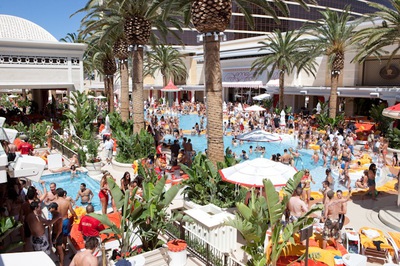
Erik Kabik/Retna/ErikKabik.com
Kelly Rowland performs at Surrender in the Encore on Sept. 5, 2010.
Tuesday, Feb. 1, 2011 | 2 a.m.
Sun Archives
- Las Vegas Strip casinos post $2.5 billion loss in year (1-31-11)
- Nongaming revenue a shaky leg for Strip to stand on (1-4-11)
- Las Vegas Strip looks to adapt to a changing market (1-2-11)
- LVCVA focusing marketing, ad strategy on ‘core’ visitors (12-15-10)
- Downtown breaks 28-month slide with October gaming win increase (12-9-10)
- Gaming executives foresee a tough year ahead (12-9-10)
What recession? Those opulent nightclubs are paying off for the Strip with their pricey bottles of booze.
The latest figures for 2010 show Strip partyers are running up huge bar tabs, offering a shot of hope to the otherwise gloomy numbers.
Although spending on gambling, food and hotel rooms continued to slide in the last fiscal period, ending June 30, statewide casino beverage sales rose 3 percent to $1.4 billion — just shy of the industry’s peak in 2007. Figures for the Strip were even better.
That’s according to the state Gaming Control Board’s annual report, released Monday.
“People are still coming here so (tourism) volume isn’t down by much ... and we know people aren’t spending like they used to,” said Mike Lawton, a senior research analyst with the Gaming Control Board. “But people still come here and drink.”
It’s a small economic bright spot in an otherwise downbeat report showing casinos had $3.4 billion in net losses — much from paying interest on debt. But at least that sum was nearly half what it was the previous year, further indication that the industry’s losses are bottoming out.
The figures for booze sales include 256 casinos generating annual revenue of at least $1 million.
The beverage increase was even more pronounced on the Strip, home to some of the country’s most expensive and profitable clubs. Beverage revenue rose 7 percent during the last fiscal period, to $909.6 million, for the 39 Strip casinos generating annual revenue of at least $1 million. Strip beverage revenue rose 2 percent in fiscal 2009. The Strip accounted for 66 percent of beverage revenue from the state’s highest-grossing casinos.
The booming nightclub industry in Las Vegas, including the emergence of a 24-hour, pool-centered party scene and a slew of elaborate new clubs and drink menus, is partly responsible for the increase, analysts say.
New clubs and lounges at CityCenter, Encore and Hard Rock Hotel, which opened a rooftop bar and pool as part of its expansion last year, are among the new venues noted in the report.
Today’s opulent nightclubs offer a potentially more expensive experience than the more mundane drinking holes of years past, said Brian Gordon, a principal with Las Vegas consulting firm Applied Analysis.
During conference calls with Wall Street analysts last year, Wynn Resorts CEO Steve Wynn highlighted the runaway success of Surrender nightclub and the attached Beach Club at Encore, which opened May 25.
The performance of its nightclub venues in Las Vegas stands in “sharp contrast to the softness in the market,” while generating high profit margins, Wynn told investors. The company reported a 16 percent increase in food and beverage revenue in the third quarter, in large part because of the new venues, surpassing revenue generated in other departments, with the exception of gambling.
Meanwhile, casinos are boosting revenue by giving away fewer drinks than in years past.
Statewide, Nevada casinos recorded 43 percent of drink sales as complimentary in fiscal 2010 compared with 45 percent the previous year. Strip casinos, which generally offer pricier drinks, reported 34 percent of beverage sales as comp revenue versus 37 percent for the same period a year earlier.
Increased beverage business isn’t enough to rescue the state’s sorry economy, as beverage revenue accounts for only 7 percent of total revenue generated by casinos statewide.
The report documents a transition period when casino giants were still accounting for vast discrepancies between the earnings expected of expensive resorts conceived before the downturn and the post-recession era of reduced spending.
Nevada casinos had about $1.5 billion in write-downs, well below the industry’s $5 billion in write-downs the previous year and contributing to a $3.3 billion reduction in net losses overall, the Gaming Control Board said.
Write-downs are a process by which companies reduce the book value of assets to account for reduced earnings expectations. Reducing the book value of assets, although making it more difficult for a company to borrow money and potentially hurting stock prices, is more of a symbolic accounting maneuver for the state and its gaming industry-dependent population than a fundamental change because it doesn’t affect or reflect what the casinos actually earn.
Nevada’s highest-grossing casinos would have reported $1.9 billion in net losses for fiscal 2010 even after removing the effect of write-downs — hardly a sign of a strong economic rebound.
Although other revenue sectors besides beverages fell in fiscal 2010, they declined by single digits, narrowing the double-digit losses of the previous year and placing those figures in line with revenue earned in 2004 and 2005, Lawton said.


Join the Discussion:
Check this out for a full explanation of our conversion to the LiveFyre commenting system and instructions on how to sign up for an account.
Full comments policy